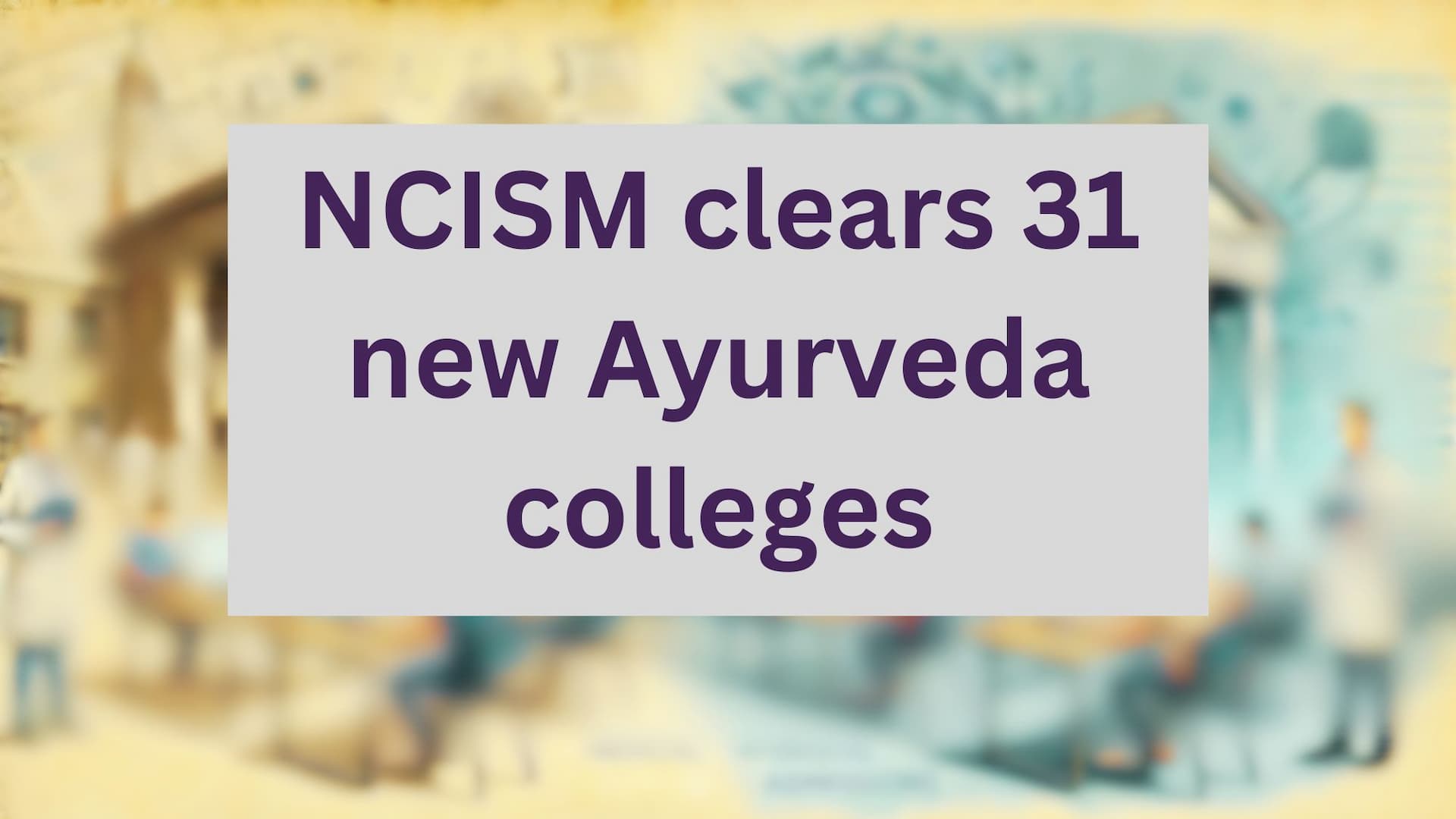NCISM clears 31 new Ayurveda colleges, adding over 2,600 BAMS seats for 2025-26
Great news for BAMS aspirants The National Commission for Indian System of Medicine (NCISM) has approved 31 new Ayurveda medical colleges, adding over 2,600 undergraduate seats for the 2025-26 academic year. This massive expansion is a huge boost for Ayurveda education in India. Get the complete details on the increased opportunities, state-wise impact (Maharashtra leads!), and what this means for your medical career path in the booming AYUSH sector. Read on for the full analysis and career prospects.

In a landmark decision that signifies the central government's strengthening commitment to traditional Indian medicine, the National Commission for Indian System of Medicine (NCISM) has greenlit the establishment of 31 new Ayurveda Medical Colleges. This major expansion, formalized through the issuance of Letters of Intent (LOI) or Letters of Permission (LOP) until November 19, 2025, will significantly increase the capacity for undergraduate studies—specifically the Bachelor of Ayurvedic Medicine and Surgery (BAMS) course—by adding a total of over 2,600 seats for the upcoming academic year, 2025-26. This move is poised to reshape the landscape of Ayurveda education and open up vast new opportunities for medical aspirants across India.
Boosting the BAMS Program: The Surge in Seat Intake
The approval granted by the NCISM's Medical Assessment and Rating Board for Indian System of Medicine (MARBISM) marks a substantial leap in the availability of BAMS seats. This decision reflects the growing global and domestic demand for qualified Ayurveda practitioners and the government's push to mainstream AYUSH (Ayurveda, Yoga and Naturopathy, Unani, Siddha, and Homoeopathy) systems.
- Total New Seats: The addition of over 2,600 new seats contributes substantially to the existing capacity of approximately 40,000 undergraduate seats available across around 536 previously approved institutions for the academic year 2025-26.
- Expansion Details: The 31 entities that received the LOI/LOP are private institutions focused on enhancing the capacity for BAMS education. This is in addition to the over 500 institutes that have already received approved or renewed approval for the academic year.
- Quality Assurance: The granting of LOI/LOP under the provisions of the NCISM Act, 2020, ensures that these new colleges meet the stringent infrastructural, faculty, and clinical requirements necessary to deliver high-quality medical education. This regulatory step is crucial for maintaining the credibility and standards of the Ayurveda degree.
- Geographical Impact: The distribution of the new colleges is noteworthy, with the maximum approvals concentrated in Maharashtra, which received permission for 21 institutions. Other states benefiting include Madhya Pradesh (4 private institutions), and one institution each in Karnataka, Bihar, Chhattisgarh, Haryana, and Uttar Pradesh. This strategic distribution aims to address regional disparities and make Ayurveda education more accessible across the country.
Opportunities for Aspiring BAMS Students
For students who have qualified the NEET-UG examination and are planning to pursue a medical career rooted in traditional Indian wisdom, this expansion is excellent news. Increased seats mean higher chances of admission and potentially more options during the Ayush Admissions Central Counseling Committee (AACCC) counselling process.
- Enhanced Admission Prospects: With over 2,600 additional seats, the competition, while still rigorous, will slightly ease, offering a better shot at securing a seat in a reputable institution for the BAMS course.
- Revised Eligibility Norms: Aspirants should note a recent positive change in eligibility criteria announced by the NCISM. Starting from the 2025 academic year, the mandatory minimum of 50% marks in Physics, Chemistry, and Biology (PCB) in Class 12 has been dropped. Students who have merely passed Class 12 with Biology or Biotechnology as a subject and qualified NEET-UG are now eligible. This broadens the applicant pool significantly.
- The Role of Counseling: Admission to the BAMS course, including seats under the All India Quota (15% of the total intake) and the State/UT Quota (85% of the seats), remains strictly based on the NEET-UG merit list and is conducted through centralized counseling by the respective state or central authorities like the AACCC. The new college details will be factored into the final seat matrix for the 2025-26 academic session.
The Flourishing Career Landscape After BAMS
A degree in Bachelor of Ayurvedic Medicine and Surgery (BAMS) is a comprehensive five-and-a-half-year program (including a mandatory one-year internship) that offers diverse and promising career trajectories in the rapidly evolving healthcare sector. The surge in new colleges further validates the robust professional scope available to graduates.
- Clinical Practice and Consultancy:
- Ayurvedic Doctor/Physician: Working in private clinics, government/private hospitals, or setting up one's own practice, specializing in areas like Panchakarma, Kshar Sutra (proctology), or Ayurvedic dietetics.
- Medical Officer: Securing employment in government health centers and hospitals under various state and central schemes like the National Ayush Mission (NAM).
- Academics and Research:
- Lecturer/Professor: Pursuing post-graduation (MD/MS in Ayurveda) and entering the academic stream to teach in Ayurveda colleges.
- Ayurvedic Researcher: Contributing to drug development, clinical trials, and scientific validation of traditional formulations in public or private research institutions.
- Pharmaceutical and Wellness Industries:
- Drug Manufacturing and Quality Control: Working in the booming Ayurvedic pharmaceutical industry, contributing to the formulation, production, and regulatory compliance of herbal medicines and wellness products.
- Ayurvedic Consultant for Wellness & Tourism: Engaging in the wellness sector, including medical tourism, spa management, and corporate wellness programs, a niche market with significant global growth.
Conclusion
The NCISM's decision to approve 31 new Ayurveda colleges and add over 2,600 undergraduate seats is a monumental step, underlining the critical importance and increasing institutional support for the Indian System of Medicine. For NEET-UG qualified aspirants, this expansion translates directly into a broader array of choices and a brighter career outlook in a field that expertly blends ancient wisdom with modern medical understanding. As Ayurveda continues its global resurgence, this investment in educational infrastructure ensures a steady supply of qualified professionals ready to serve the nation's healthcare needs.
For regular updates follow Only Education News. For more details on medical entrance exams and courses, check here: Medical Exams List.
